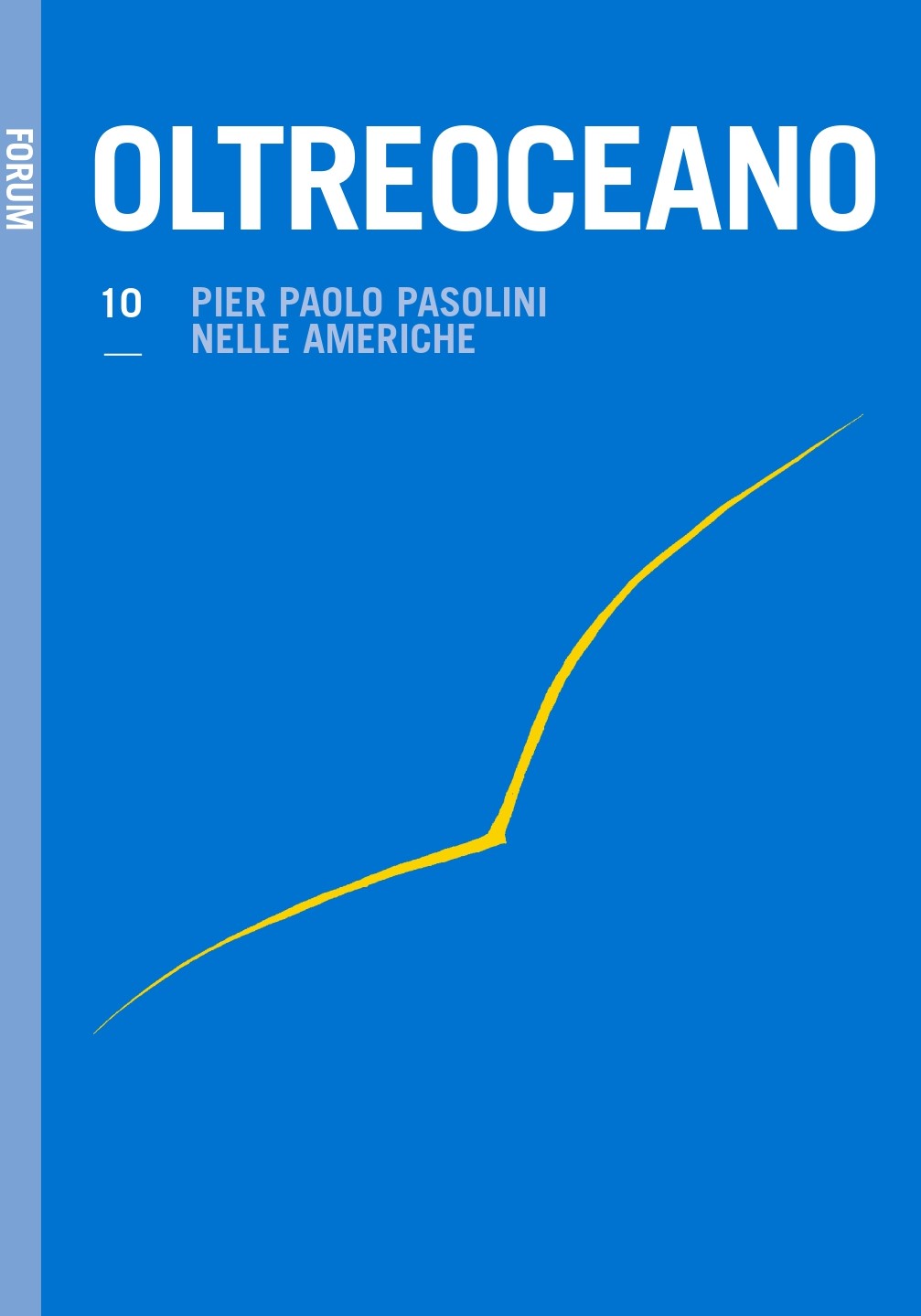Le Americhe di Pasolini. Pasolini nelle Americhe
Keywords:
Pasolini, America, Québec, influenza, presenzaAbstract
I contributi del presente numero dedicati alla ricezione dell’opera di Pier Paolo Pasolini in Canada e Québec, in Ispano-America e in Brasile, insieme agli omaggi poetici di autori della diaspora italiana, consentono di cogliere, via le Americhe, i contorni di un pensiero e di una poetica che anticipano alcuni nodi centrali dell’attuale problematica postcoloniale.
Pasolini’s Americas. Pasolini and the Americas
The contributions to this number of Oltreoceano – dedicated to the reception of Pasolini’s work in Canada and Québec, in Ibero-America and in Brazil – allow readers to understand the outline of a thought and a poetics that anticipate some core issues in the contemporary postcolonial debate.
Downloads
References
Amoroso, M. B. (2007): As periferias do mundo. Pasolini e o Brasil. Via Atlântica, 12, pp.79-80.
Barbato, A. (2010): L’alternativa fantasma: Pasolini e Leiris, percorsi antropologici. Padova: libreriauniversitaria.it.
Bongie, Ch. (1991): A Postscript to Transgression: The Exotic Legacy of Pier Paolo Pasolini. In Ch. Bongie, Exotic Memories: Literature, Colonialism and the Fin de siècle (pp. 188-228). Palo Alto: Stanford UP.
Caminati, L. (2007): Orientalismo eretico. Pier Paolo Pasolini e il cinema del terzo mondo. Milano: Bruno Mondadori.
Cecchetto, F. (2012): Pasolini ai tropici: presenza e fortuna critica di Pasolini in Brasile. Studi pasoliniani, 6, pp. 145-161.
Chiesi, R. (Ed.) (2011): L’Oriente di Pasolini. Il fiore delle Mille e una notte nelle fotografie di Roberto Villa. Bologna: Cineteca di Bologna.
D’Alfonso, A. (2009): In corsivo italico. Trad. di S. Mangione. Isernia: Iannone.
D’Alfonso, A. (1997): In Italics: In Defense of Ethnicity. Toronto: Guernica.
Di Blasi, L., Gragnolati, M. & Holzhey Ch. F. E. (Eds.) (2012): The Scandal of Self-Contradiction: Pasolini’s Multistable Subjectivities, Traditions, Geographies. Vienna / Berlino: Institute for Cultural Inquiry / Turia & Kant.
Dumontet, D. (2014): La revue Vice Versa et le procès d’autonomisation des écritures migrantes. Zeitschrift für Kanada-Studien, 34, pp. 87-104.
Finazzi-Agrò, E. (2001): Il nodo inestricabile: il Brasile di Pier Paolo Pasolini. In G. Bellini & D. Ferro (Eds.), L’acqua era d’oro sotto i ponti. Studi di iberistica che gli amici offrono a Manuel Simões (pp. 113-124). Roma: Bulzoni.
Greene, Sh. (2012): Zumurrud in her camera: Pier Paolo Pasolini and the global south in contemporary Italian film. In Sh. Greene, Equivocal Subjects: Between Italy and Africa Constructions of Racial and National Identity in the Italian Cinema (pp. 210-252). New York: Continuum.
Lahud, M. (1985/12/02): O poema de Pasolini para o Brasil. Folha de São Paulo, s.p.
Lahud, M. (1993): A vida clara. Linguagens e realidade segundo Pasolini. São Paulo: Unicamp / Companhia das Letras.
Luijnenburg, L. (2013): The Other in Italian Postcolonial Cinema. Pasolini and Fellini. Two Case Studies. Incontri. Rivista europea di studi italiani, 28, pp. 33-43.
Pacchioni, F. (2008): Pasolini in North America. A Bibliographical Essay on Scholarship Between 1989 and 2007. Studi Pasoliniani, 2, pp. 139-155.
Pandolfi, V. (Regia), (1963): Gli ultimi.
Pasolini, P. P. (Regia), (1968): Appunti per un film sull’India.
Pasolini, P. P. (Regia), (1969): Appunti per un’Orestiade africana.
Pasolini, P. P. (Regia), (1969): Medea.
Pasolini, P. P. (Regia), (1971-1974): Le Mura di Sana’a.
Pasolini, P. P. (1971): Gerarchia. In P. P. Pasolini, Trasumanar e organizzar (pp. 189-192). Milano: Garzanti.
Pasolini, P. P. (1955): Ragazzi di vita. Milano: Garzanti.
Trento, G. (2010): Pasolini e l’Africa. L’Africa di Pasolini. Panmeridionalismo e rappresentazioni dell’Africa postcoloniale. H. Joubert-Laurencin (Pref.). Milano / Udine: Mimesis.
Welch, R. N. (2014): Here and Then, There and Now: Nation Time and Colonial Space in Pasolini, Oriani and Marinetti. Italica, 4, pp. 625-653.
Downloads
Published
How to Cite
Issue
Section
License

This work is licensed under a Creative Commons Attribution-NonCommercial-ShareAlike 4.0 International License.
The authors undertake to comply with the following conditions, which are considered accepted at the time of submission of their contributions.
The sending of a text implies that it is unpublished and not submitted to be published elsewhere.
1. If accepted, the author shall confer on the publisher the right to publish and distribute it both in paper form and in the online electronic edition. The published articles will be downloadable and made available in open access.
2. Provided that it correctly indicates that the first publication took place in the journal Oltreoceano. Rivista sulle migrazioni the author has the right to: a) reproduce the article in separate extracts or collected in a volume; b) publish the article on their personal website or teaching site provided that these sites are of a non-commercial nature; c) deposit the article in online archives of a non-commercial nature, linked to the institution they belong to or as part of projects for the non-commercial dissemination and open access of scientific works.
The use of contributions by third parties, for commercial or otherwise unauthorized purposes, is not allowed. The publisher declines all responsibility for the unauthorized use of the material published in the journal.












